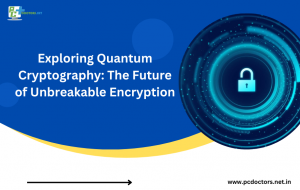Exploring Quantum Cryptography: The Future of Unbreakable Encryption
- October 27, 2023
- Cyber Security Services
- Posted by Administrator
- Leave your thoughts
Introduction
In an age where digital communication and data privacy are paramount concerns, the world of cryptography has been on a relentless quest to develop unbreakable encryption methods. The emergence of quantum cryptography has ignited a beacon of hope, promising a future where information can be secured with unparalleled certainty. In this article, we delve into the fascinating realm of quantum cryptography and how it is poised to reshape the landscape of data security.
The Quest for Unbreakable Encryption
Before we embark on our journey into quantum cryptography, it is essential to understand the prevailing challenges in the world of classical cryptography. For decades, cryptographic techniques have been devised to protect data from prying eyes and malicious actors. Yet, as technology advances, so do the methods used to crack encryption.
In recent years, the advent of quantum computers has posed a significant threat to classical encryption. Quantum computers, harnessing the power of quantum bits or qubits, have the potential to perform calculations at speeds hitherto unimaginable. This means that many of the encryption algorithms currently in use could be rendered obsolete, as quantum computers can swiftly decipher even the most complex codes.
The Quantum Leap: How Quantum Cryptography Works
Quantum cryptography relies on the fascinating principles of quantum mechanics to ensure secure communication. At its core, it leverages the behavior of quantum particles like photons, which can exist in multiple states simultaneously. This property forms the basis of two fundamental concepts in quantum cryptography:
Quantum Key Distribution (QKD): QKD is the cornerstone of quantum cryptography. It involves the transmission of cryptographic keys encoded in the form of quantum bits or qubits. Unlike classical encryption, where the security of the key exchange relies on mathematical complexity, QKD relies on the laws of quantum physics. Any attempt to eavesdrop on the quantum key exchange will inevitably disturb the qubits, alerting both the sender and receiver to the intrusion.
Quantum Entanglement: Quantum entanglement is another perplexing quantum phenomenon. When two particles become entangled, their states become correlated in such a way that the state of one particle instantaneously affects the state of the other, regardless of the distance separating them. This property allows for the creation of tamper-evident quantum channels, making it nearly impossible for unauthorized parties to intercept information without detection.
The Unbreakable Promise
Quantum cryptography holds the promise of unbreakable encryption by offering two crucial advantages:
Security Through Physics: Unlike classical encryption, which relies on mathematical algorithms, quantum cryptography is rooted in the laws of physics. Any attempt to compromise a quantum-encrypted message would disrupt the quantum states of particles, immediately revealing the intrusion.
Future-Proofing: Quantum-resistant cryptographic algorithms can be developed to withstand attacks from quantum computers. As quantum computing power advances, quantum cryptography can adapt to maintain data security.
Practical Applications
The potential applications of quantum cryptography are far-reaching:
Secure Communications: Governments, businesses, and individuals can communicate with absolute confidence that their messages are safe from interception.
Financial Transactions: Quantum cryptography can revolutionize online banking and financial transactions by ensuring the utmost security for sensitive data.
Healthcare: The healthcare sector can benefit from quantum cryptography by safeguarding patient data, ensuring the privacy of medical records, and enabling secure telemedicine.
National Security: Governments can enhance their national security measures by using quantum cryptography to protect classified information from adversaries.
Challenges and Future Developments
While quantum cryptography holds immense promise, it is not without its challenges. Practical implementations are still in the nascent stage, and widespread adoption is yet to become a reality. Researchers continue to work on overcoming issues related to scalability, cost-effectiveness, and the development of quantum-resistant algorithms.
Conclusion
Quantum cryptography represents a quantum leap forward in the quest for unbreakable encryption. As technology evolves, so do the threats to data security. Quantum cryptography offers a beacon of hope by harnessing the peculiarities of quantum mechanics to secure our digital future.
In this digital age, where data breaches and cyberattacks are a daily occurrence, the need for robust cybersecurity measures cannot be overstated. This is where PC Doctors .NET steps in as your trusted partner. We understand the evolving landscape of cybersecurity, and our expert team is dedicated to providing cutting-edge solutions to keep your data safe and your peace of mind intact. We offer a range of cyber security services tailored to your specific needs, from threat assessment and vulnerability management to incident response and secure network design. Our goal is to ensure that your digital assets remain impervious to even the most advanced threats. Trust us to be your partner in securing your digital world, so you can confidently embrace the quantum age with unbreakable encryption. Contact us today and experience the peace of mind that comes with the best in cyber security services. For more details about Cyber Security Services, please visit https://pcdoctors.net.in/, or call 1800-889-0674 (TOLL-FREE).

